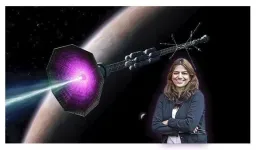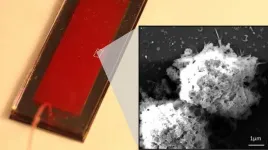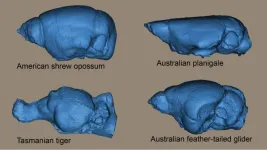(Press-News.org) Recent events such as the Covid-19 pandemic, locust infestations, drought and labour shortages have disrupted food supply chains, endangering food security in the process. A recent study published in Nature Food shows that trade restrictions and stockpiling of supplies by a few key countries could create global food price spikes and severe local food shortages during times of threat.
'We quantified the potential effects of these co-occurring global and local shocks globally with their impacts on food security,' explains Aalto University Associate Professor Matti Kummu. The results of this research have critical implications on how we should prepare for future events like Covid-19, he says.
The researchers modelled future scenarios to investigate the impact of export restrictions and local production shocks of rice, wheat, and maize would have on their supply and price. These three crops form the backbone of global trade in staple crops and are essential for food security across the globe.
The results show that restriction by only three key exporters of each crop would increase the price of wheat by 70%, while maize and rice would rise by 40% and 60%. When combining this with potential local shocks that occurred last year, the prices would nearly double.
Kummu explains: 'This is the result of an increasingly interconnected world, in which the majority of countries are dependent on imported food and, so, vulnerable to this kind of shock.'
'We saw that trade restrictions by only a few key actors can create large short-term price spikes in the world market export price of grains, which can lead to food insecurity in import-dependent countries,' explains Postdoctoral Researcher Theresa Falkendal, Potsdam Institute for Climate Impact Research.
By suddenly losing more than one-third of their annual grain supply, many low-income and lower-middle-income countries in Africa and Asia would not be able to cover this grain supply deficit with their domestic reserves, and would need alternative grain sources to survive.
'It's important to realise that food security depends on both local and remote conditions, and imprudent policy decisions in the rich part of the world can plunge people into real hardship in poorer parts of the world,' states Falkendal.
But shock scenarios such as those modelled by the researchers and the risks they bring may become commonplace thanks in part to global warming.
The Covid-19 pandemic's effect on global agricultural supply chains, as well as locusts destroying crops and livelihoods in the Horn of Africa and South Asia, have had a devastating effect on food security.
'To help prevent such devastation in the future, we need proactive strategies, like reducing food waste, changing the diet towards more plant-based protein sources, and increasing the yields sustainably particularly in the most vulnerable countries,' says Kummu.
'While sustainable design of agricultural systems is important, it must go hand-in-hand with efforts to improve political decisions and accountability,' says Michael J. Puma, research scientist and fellow at Center for Climate Systems Research, Earth Institute, Columbia University.
These solutions would ease a lot of pressure on resources that are needed for food production and help improve the self-sufficiency of low-income and middle-income countries.
Thus, timely and coordinated international responses are needed to minimise threats to food security especially to low-income and middle-income countries which lack the resources and purchasing power of larger nations, to ensure affordable staple grains for the world's poorest citizens, and to avert a humanitarian crisis.
'It's essential that humanitarian institutions strengthen their efforts to support democratic accountability around the world, which will ultimately help us to avoid severe food insecurity and famine,' concludes Puma.
INFORMATION:
A new type of rocket thruster that could take humankind to Mars and beyond has been proposed by a physicist at the U.S. Department of Energy's (DOE) Princeton Plasma Physics Laboratory (PPPL).
The device would apply magnetic fields to cause particles of plasma, electrically charged gas also known as the fourth state of matter, to shoot out the back of a rocket and, because of the conservation of momentum, propel the craft forward. Current space-proven plasma thrusters use electric fields to propel the particles.
The new concept would accelerate the particles using magnetic reconnection, a process found throughout the universe, including the surface of the sun, in which magnetic ...
Knowing how to predict the specific composition and cell design that would result in optimum performance is one of the greatest unresolved problems in materials science. This is, in part, due to the fact that the device performance depends on multiple factors.
Now, researchers from the Institute of Materials Science of Barcelona, specialized on materials for energy applications, have collaborated with researchers from the Universitat Rovira i Virgili specialized in Artificial Intelligence, to combine the experimental data points that they gather with artificial intelligence algorithms ...
Building on the promise of emerging therapies to deploy the body's "natural killer" immune cells to fight cancer, researchers at the University of Michigan Rogel Cancer Center and U-M College of Engineering have gone one step further.
They've developed what is believed to be the first systematic way to catch natural killer cells and get them to release cancer-killing packets called exosomes. These nano-scale exosomes are thousands of times smaller than natural killer cells -- or NK cells for short -- and thus better able to penetrate cancer cells' defenses.
A proof-of-concept study in blood samples from five patients with non-small cell lung cancer demonstrated that the approach was able to capture natural killer cells on a microfluidic ...
Paris, France, January 27th 2021 -- COVID-19 vaccine distribution has begun across the globe, while many countries are still struggling with the rampant rise of infections. Owkin, a French-American startup pioneering AI and Federated Learning in medical research, has been focusing it's COVID-19 research efforts on aspects of the pandemic that still require much public health attention, despite the arrival of an effective vaccine.
Efforts to support frontline health systems as they devote their resources to the influx of COVID-19 related hospitalizations, ...
Seawater makes up about 96% of all water on earth, making it a tempting resource to meet the world's growing need for clean drinking water and carbon-free energy. And scientists already have the technical ability to both desalinate seawater and split it to produce hydrogen, which is in demand as a source of clean energy.
But existing methods require multiple steps performed at high temperatures over a lengthy period of time in order to produce a catalyst with the needed efficiency. That requires substantial amounts of energy and drives up the cost.
Researchers from the University of Houston have reported an oxygen evolving catalyst that takes just minutes to grow at room temperature on commercially available nickel foam. ...
Mason scientists employ a rapid-result, saliva-based test that significantly expands testing capacity, and an antibody test that can track vaccine response.
George Mason University announces it is introducing a rapid-result, saliva-based COVID-19 test that will greatly expand testing capabilities on its campuses this spring. The effort, led by Mason's faculty, is part of a comprehensive program to better track and control the virus on campus.
Mason scientists, who are pushing the boundaries of technologies that are keeping Mason's campuses safe, are ...
The main culprit in cancer is healthy cells that have gone rogue and acquire the ability to divide uncontrollably. These cells acquire growth advantages over normal cells and manipulate their environment by altering the cellular pathways involved in growth and metabolism. Over the past few decades, various altered pathways and proteins have been identified as targets for therapeutic interventions. However, what remains challenging is selectively targeting cancer cells and ensuring that the drug reaches the tumor in adequate amounts, without severely affecting normal cells. And in this regard, biocompatible delivery vehicles (which are non-toxic to normal cells) can be useful.
One such potential candidate is "porphyrins," a group of organic cyclic compounds that form the ...
Being stretchy and squeezable may be the key to finding space for the brain in mammals, including humans.
An international study, co-led by Flinders University's Vera Weisbecker, has revealed that marsupial mammals like possums, kangaroos, and wombats appear to have a lot of flexibility when it comes to accommodating their brains into their skulls.
"The brain is one of the heaviest parts of the head, particularly in smaller mammals. But it needs to be placed in a way that doesn't interfere with the many vital functions of the head, such as seeing, hearing, smelling and of course feeding," says Dr. Weisbecker.
"Stowing" a large brain ...
WASHINGTON -- Researchers have developed a new approach that improves the image quality and contrast for holographic displays. The new technology could help improve near-eye displays used for virtual and augmented reality applications.
"Augmented and virtual reality systems are poised to have a transformative impact on our society by providing a seamless interface between a user and the digital world," said research team member Jonghyun Kim from technology company NVIDIA and Stanford University. "Holographic displays could overcome some of the biggest ...
(Singapore--January 28, 2021 11:00 p.m. SPT/10:00 a.m. EST)----Several leading international lung cancer researchers at a press briefing held by the International Association for the Study of Lung Cancer today, presented compelling new data revealing that factors of race, gender, sexual orientation and income continue to be significant barriers to those living with lung cancer. The press briefing is part of the IASLC's World Conference on Lung Cancer 2020 Singapore.
The press briefing is moderated by IASLC Communications Committee Chair Dr. Anne-Marie Baird, senior research fellow at Trinity College in ...




